A strength of the SPH community is its commitment to attracting, training and engaging students, faculty and staff from different backgrounds, cultures, values and perspectives. We seek to create an environment that invites and values the contributions of everyone so that we can fulfill our public health mission. Toward this end, we are committed to honest and respectful dialogue, treating everyone with dignity and respect, and managing tensions and different viewpoints with maturity, sensitivity and as growth opportunities. We view this approach to diversity as fundamental to achieving our educational, research, practice and professional development goals because it provides opportunities for us to expand our horizons, learn from each other and do our best work.
How do we define diversity, equity, inclusion, and
anti-racism(ist)?
In the fall of 2015, the university issued a campus-wide charge to develop strategic plans that demonstrate each school or college's commitment to diversity, equity, and inclusion. In response, the School of Public Health adopted the following definitions and commitments:
- Diversity: We commit to increasing diversity, which is expressed in myriad forms, including race and ethnicity, gender and gender identity, sexual orientation, socioeconomic status, language, culture, national origin, religious commitments, age, (dis)ability status, and political perspective.
- Equity: We commit to working actively to challenge and respond to bias, harassment, and discrimination. We are committed to a policy of equal opportunity for all persons and do not discriminate on the basis of race, color, national origin, age, marital status, sex, sexual orientation, gender identity, gender expression, disability, religion, height, weight, or veteran status.
- Inclusion: We commit to pursuing deliberate efforts to ensure that our campus is a place where differences are welcomed, different perspectives are respectfully heard, and where every individual feels a sense of belonging and inclusion. We know that by building a critical mass of diverse groups on campus and creating a vibrant climate of inclusiveness, we can more effectively leverage the resources of diversity to advance our collective capabilities.
Further, during Summer 2020 the school created a short-term anti-racism working group to expand upon diversity, equity, and inclusion efforts and help formulate distinct, intentional initiatives to address racism. The group reviewed relevant literature and content by anti-racism leaders to establish the following definitions. These helped inform the group's efforts, and are used to support ongoing, longer-term anti-racism efforts at the school:
- Anti-racist: An individual who believes all racial groups are equal and acts as such, and demonstrates a continuous and ongoing commitment to eradicating racial inequities in social, economic, and political life.
- Anti-racism: The active process of working to dismantle ideas, structures, practices, and policies that espouse racial hierarchies or result in different outcomes or treatment of people based on race. This work can be accomplished at the individual, social, and institutional levels.

